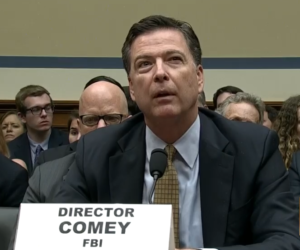TPP and Democratic Self-Delusion
After months of telling Bernie Sanders to drop out, the political chatterers are finally understanding one reason he did not do so: to maintain leverage over things like the party platform. After the platform was finalized yesterday, Bernie declared victory.
Pressed by supporters of U.S. Sen. Bernie Sanders, Democratic Party platform writers meeting this weekend in Orlando, Florida, adopted a progressive agenda that underscores the need for bold action on climate change, addresses criminal justice reform and calls for doubling the federal minimum wage.
“We have made enormous strides,” Sanders said. “Thanks to the millions of people across the country who got involved in the political process – many for the first time – we now have the most progressive platform in the history of the Democratic Party.”
The Platform Committee also adopted an amendment focused on criminal justice reform which calls for an investigation by the Department of Justice to investigate all shootings involving police officers.
The platform that will be submitted at the Democratic National Convention later this month in Philadelphia also would support Congress putting a price on carbon and methane to discourage continued use of fossil fuels that are causing severe climate change. The platform also says lawmakers must consider the impact on the climate in all federal decisions and invest heavily in wind and solar power rather than natural gas.
Delegates allied with Hillary Clinton’s and Sanders’ campaigns also passed amendments to fight for a $15 federal minimum wage tied to inflation, urged passage of progressive immigration reform and called for legalization of marijuana.
There were three issues, however, where Sanders’ delegates lost: opposition to Israeli settlements, a ban on fracking, and opposition to the Trans-Pacific Partnership.
The first two make sense: after all, those policy positions match Hillary’s stated position (though the US is supposed to be opposed to illegal settlements), so rejecting Sanders’ amendments equated to backing the nominee instead. That’s the way it’s supposed to work.
But Hillary, of course, claimed to oppose the TPP during the primary, even if that claim was always sketchy coming as it did as she worked so hard to negotiate the crappy deal as Secretary of State. So the mealy-mouthed language in the platform about protecting workers — akin to the same language in the Colombia Trade Deal that did squat to protect workers — is more notable.
As is the idiotic opinion expressed by this person, described by Robert Reich as an acquaintance from the Clinton White House.
ACQUAINTANCE: “Don’t you think your blog post from last night was a bit harsh?”
ME: “Not at all. The Democratic Party is shooting itself in the foot by not officially opposing the Trans Pacific Partnership.”
[They talk about how the Democrats are supporting this to back the President.]
ME: “But it’s terrible policy. And it’s awful politics. It gives Trump a battering ram. Obama won’t be president in six months. Why risk it?”
ACQ: “They don’t see much of a risk. Most Americans don’t know or care about the TPP.”
ME: “But they know big corporations are running economic policy. They think the whole system is corrupt. Believe me, Trump will use this against Hillary.”
ACQ: “He can’t. She’s inoculated. She’s come out against the TPP.”
ME: “But it’s her delegates who voted not to oppose it in the Democratic platform. Her fingerprints are all over this thing.”
Trump may not have many articulated policy positions, but his stance against TPP has been consistent and (unsurprisingly loud). Reich is right: to the extent that platforms mean anything at all, this will be used by Trump to pitch Democrats as sell-outs to American workers.
And the notion that voters won’t react against TPP is insulting. Sure, they may not know how specifically bad TPP is, but workers do know that NAFTA sucked. And Trump is certainly capable of equating the two.
Whoever this person is, by nature of being a Hillary advisor, he or she is supposed to be a technocratic elite. But this is idiotic, both from a policy and a political perspective.

